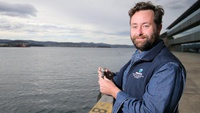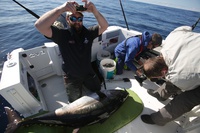IMAS researcher interview with Dr Sean Tracey
Samantha Twiname, 12 Oct 2016.
Dr Sean Tracey is a Senior Research Fellow at the Institute for Marine and Antarctic Studies with a real passion for the ocean and its inhabitants. His research career has spanned many areas, from global fisheries and food security to studying recreational fisheries. We had a chat to Sean about his research, climate change and what he likes to do in his (rare) spare time.
What inspired you to get into science?
I have always had a passion for the marine environment having spent much of my life scuba diving, surfing, swimming and fishing. My first jobs were working in the fishing industry – both wild fisheries and aquaculture production. I was always intrigued about the fish and invertebrates I was working with, how they used the marine environment and how the fisheries interacted with them, and also how this related to how they were managed.
Why is your research important?
One of my main research focuses at the moment is recreational fishing, and I think that it is critically important as there is a real knowledge gap relative to other areas of fisheries research. Having a robust understanding of not only the impacts of recreational fishing and how practices can be improved through evidence based information, but also quantifying the socio-economic benefits are paramount as we move forward to holistic fisheries management. This increased understanding will go a long way to improving resource stewardship from recreational fishers as well as providing recreational fishing representatives and governments robust information to make informed decisions about the future of recreational fishing in Australia.
What has been your most important scientific finding?
One of the big projects that we completed recently was a 3-year study looking at post-release survival of southern bluefin tuna caught by recreational fishers. This is an iconic species that has been overfished in the past to a dire point by commercial fishing but we are seeing a rebound in the stock at the moment which is great. We’re also seeing an increase in the recreational engagement with this species across south-east Australia. Catch and release is an important component of this fishery, as it is with many recreational fisheries, but up until this study we didn’t have any idea what the rate of survival was of the fish that were released. We ended up conducting one of the largest post release survival studies using satellite tags in the world. We found that if the fish are treated well, the post-release survival rate is quite high for this species. This was quite an important scientific finding that feeds into not only the recreational sector and aids them make informed decisions when they are fishing, but also can be considered in the international management of this very important fish stock.
Does climate change make you feel concerned?
I’m a glass half full kind of guy. It does make me feel concerned and it’s something that needs to be addressed but I also think that we need to be ready for opportunities as they arise. I think that being proactive would be really positive moving forward. A lot of fisheries management and research is reactive as it is often as a result of focusing on current issues, which is obviously important, but proactive research is limited by logistics and ultimately immediate funding priorities. In saying this I think we have the ability to be proactive and adapt to climate change and its effects on the marine environment.
What do you like to do when you aren't working on research?
I don’t get much time to do that [laughs]. I like to spend time with my kids and to be honest with you I still like to spend time around the water. I am also enjoying getting into the garden, now that spring is here.
What is the last book you read for fun?
I’ve actually been reading, and this is probably a reflection of my love for the job, a book by an author called Zane Grey. He was a recreational fisherman around the 1920's and he writes about his experience with tuna and swordfish fisheries around the world. The way he pens the stories is very descriptive. It’s quite interesting reflecting on the excitement he conveys about his adventures. I can relate quite strongly with them, even almost 100 years later, that same level of excitement, exploration and inquisitive nature is what drives my passion for the ocean. It’s interesting to see how the fisheries and the techniques have evolved but the excitement and sense of exploration of the ocean is still just as relevant today.
You can find Sean’s published work on post-release survival of southern bluefin tuna here (or email enquiries@redmap.org.au for a copy of the paper).













